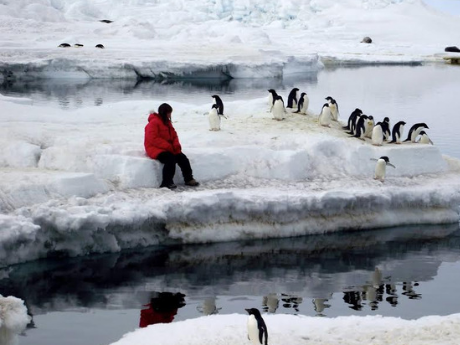In Their Own Words
Jynne Dilling Martin's “Out of Whose Womb Came the Ice?”

Out of Whose Womb Came the Ice?
The Yup'ik Eskimo believes the crusted earth is perched
on a turtle shell; the vulcanologist peering over the cone
sees the veins of her primordial eye as she blinks back.
The geologist drills down toward wrinkled skin, forgetting
what his ancestors knew: the longer you dig into darkness,
the harder it will be to know your own face in a mirror.
The greater the pressure of pack ice enveloping Shackleton's ship
the louder the officer in the crow's nest recited the book of Job:
The hoary frost of heaven, who hath gendered it?
Unfortunately Mrs. Chippy, the carpenter's cat, must be shot,
wrote Ernest in his journal. A snow petrel attempted a dive
and the ice closed on her forever. The carpenter closed his eyes
at the crack of the gun. The waters are hid as with a stone.
An unexplained virus is decimating reptile populations,
bats mottled in fungus pile up at the mouths of caves,
instruments lowered on strings cannot find an answer.
An underwater camera in the sludge of an Antarctic lake
shows a carpet of cyanobacteria radiating orange light.
Maybe life on Earth started like this, or maybe this is the end.
When Yup'ik girls have their period, they know not to look at the sky.
All rights reserved. Reprinted with the permission of the author.
On "Out of Whose Womb Came the Ice?"
During my stay in Antarctica, I met a woman who'd spent several years teaching Yup'ik children in Alaska. Joolee told me how baffling the Common Core curriculum had been for the elementary school kids: they had no reference point for a cow, a lawn mower, a grandfather clock. A grandfather clock! How inane we've become; and, heaven help us, what forms of knowledge we've forgotten. It brought to mind an obituary I'd read in The Economist of Mau Piailug, the last man alive who could still navigate the ocean by the stars.
Different forms of knowing were already on my mind at that time. The staggering enormity of the Antarctic landscape dwarfed us; the age of the glaciers showed what a fingernail of time human civilization represents. A drill pulled up 800,000 year old ice, from when mammoths still roamed the planet. We chipped ancient ice into our whiskey; things got existential real fast.
This poem title comes from the Book of Job; thousands of years later we still ask the same questions, crave understanding, and die without explanations. "Mrs. Chippy, the carpenter's cat, must be shot" comes verbatim from the October 1915 journal of polar explorer Ernest Shackleton, and that line is either incredibly funny or unbelievably grim to me when I read it, depending on my mood. I find both humor and beauty in searching, in not knowing, in flourishing and in decay. The textures are endless and I love to catalogue all of it.
Joolee had seen me copying details out of old Antarctic journals like "the pull of short-legged huskies is often steadier" and "the abundance of squids at different times of the year is not known." (I still have yet to write my great Unknown Squid epic poem). She came running after me one day as I left the dining hall and said "Jynne, I just remembered something that I think you'll like. When Yup'ik girls have their period they don't look at the sky." The poem began then and there.


